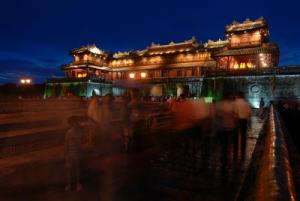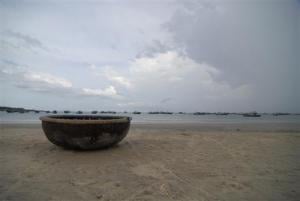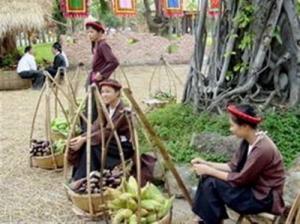Chử Đồng-Tử and princess Tiên Dung

Long time ago in the kingdom of Văn Lang, there lived a king named Hùng Vương the Third. He had a daughter who was blessed with truly divine beauty, of which why they named her Tiên Dung. But despite her gift of enchanting loveliness, the princess remained indifferent to any man’s affection and no prince or king from all neighboring kingdoms ever succeeded in winning her heart.
Instead, Tiên Dung developed a love for nature and beautiful sceneries to which she spends all of her days wandering the many wondrous places of her father’s kingdom. As Hùng Vương loves his daughter so dearly, he had always granted her every wish to explore the numerous rivers in his realm that fascinated the princess so greatly. He provided her a number of vessels and a royal barge, along with a large number of servants and guards to keep her only beloved daughter safe in her every journey.
Meanwhile, in the village of Chử Xá, away from Hùng Vương’s great tall palace, a very poor fisherman and his only son Chử Đồng-Tử lived in a tiny cottage and fished everyday for food. But great misfortune struck them, burning their house to the ground, leaving them nothing but a single piece of loincloth. Having lost all other belongings and all their clothes, Chử Đồng-Tử and his father had to take turns wearing the only piece of cloth they had left.
When his father grew old and ill, Chử Đồng-Tử was told by him to keep the loincloth for himself after he dies. But his strong love and respect for his father could not make him keep the cloth. Instead, after his father died, he used it to drape his body and buried him with honor. Left with no garment of any kind, the poor boy had to fish at night. And during the day, he would sell his catch to the villagers passing along the river while submerged in the water from waist below.
One pleasant afternoon, while Tiên Dung, accompanied by her servants and guards, was searching for new places to explore, their journey led them to Chử Xá and to the very river where Chử Đồng-Tử spends fishing every night and sells his catch during the day. Startled by the sound of the drumbeats and the sight of the royal entourage, the young man quickly hid himself behind some bulrushes, dug a hole in the sand and covered himself with it almost completely.
But because the princess greatly admired the newfound scenery, she expressed a desire to bathe in the river. Granting her wishes, the servants set her up a tent on the shore where the princess entered and disrobed, then started pouring water on herself. As the water slowly trickled to the ground, it began to wash away the sand Chử Đồng-Tử covered himself with until nothing was left, revealing the young man’s completely naked body lying beneath her feet.
Astonished of Chử Đồng-Tử’s presence, Tiên Dung quickly covered herself up while the frightened, terrified man laid motionless on the ground, his head turned away and was begging for pardon. He explained to the princess about how he gave the only garment they have to clothe his dead father and had to hide himself from people by fishing in the dark. In an attempt to cover himself from the princess and her servants, he hid under the sand where unexpectedly, Tiên Dung later decided to bathe.
Realizing the young man had done nothing wrong, the princess was not displeased with Chử Đồng-Tử. Recognizing how only fate could have allowed their paths to cross, she told the young man, “I have vowed not get married, but Heaven had ordained this meeting and I can never oppose its Will.” She then ordered her officers and maids to clothe the young man and prepare for their wedding.
Chử Đồng-Tử was properly clothed, and then he and the princess got married the same evening at the very river they met. When news about the marriage reached the king, he became furious and ordered his guards never to let his daughter enter the gates of his palace again. Since it was impossible for her to return, Tiên Dung settled with her husband in his small village, used what’s left from her riches, and together, they earned a living by trading. With Chử Đồng-Tử’s selling experiences and Tiên Dung’s charm, their trade flourished and the village of Chử Xá soon became known. Merchants within the kingdom and neighboring kingdoms came to do business with the young couple.
One day, on a trip to purchase merchandise they could use to sell, a severe storm led Chử Đồng-Tử to the island of Quỳnh Viên. There, he met a Taoist priest who, in an instant, recognized the sign of immortality on the young stranger’s forehead. The priest offered to help Chử Đồng-Tử reveal the secrets of his immortality in which the young man decided to stay in the island for a year in order to be initiated into the path of the Taoist way.
A year had passed and the time had come for Chử Đồng-Tử to return to his home and to his beloved Tiên Dung. Before parting, he was handed by the priest a pilgrim’s staff and a conical hat made of palm leaves and was told never to be without them, as both will protect him from harm and endow his needs. Upon returning home, he revealed to his wife the wonderful things he had learned from the priest. Eager to find her own path along with her husband Chử Đồng-Tử, they repented their earthly sins, abandoned their possessions and left their home in search for a deserted place where they could devote themselves to following the True Doctrine.
Together, they walked all day, and their search led them to the wilds where they grew very exhausted and decided to stop for the night. Before lying down to sleep, Chử Đồng-Tử planted his staff to the ground and crowned it with the conical hat.
In the middle of the night, the couple was awakened by a great loud thunder. When they both got up, they were bewildered to see a magic citadel slowly rising from the earth. Within its walls were castles made of emeralds and jades filled with priceless treasures, surrounded by courtiers, guards and maidens welcoming them to the gates as rulers of the new kingdom. Chử Đồng-Tử and his wife entered the great walls, and together, they began a reign of peace and prosperity.
The news about the magic citadel quickly spread over the kingdom and villagers and inhabitants from surrounding cities came to offer respects to the holy shrine. When the king learned of it, he became enraged believing his daughter is forming a dynasty against him. Quickly, he ordered his generals to assemble the troops and destroy her daughter’s kingdom.
When everyone in the citadel heard that the king’s army is approaching, they asked Tiên Dung to send them forth to fight. But calmly the princess said, “I do not wish to defend this holy place with the use of force. This was created by the Heavens and Heaven will decide its fate. I have defied my father once. Let him have what he wishes.”
Evening arrived and King Hùng Vương’s men camped on the river’s bank across the citadel where they could wait for sunrise to launch an attack. Miraculously, a violent storm suddenly came. Its strong winds tore away the branches and trees and whirled around in great force lifting the whole citadel to the heavens in one enormous gust.
When the army arrived the next morning, the citadel and all of its inhabitants were no longer to be found. In its place, they found a marshy pond and a sandy beach instead. Returning to their kingdom, disclosing to the king what had taken place, Hùng Vương realized his mistakes. He then ordered his men to build a temple in place of the lost citadel in memory of his daughter Tiên Dung and Chử Đồng-Tử. He named the pond Đầm Nhất Dạ, which means “Pond Formed in One Night” and he called the beach Bãi Tự Nhiên (“Spontaneous Beach”) which he, and the whole kingdom, forever honoured.









